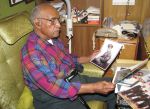(Part two of a series)
When most people think about the military draft, enforced for several U.S. wars, their thoughts are negative. But for Lt. Col. George N. Charlton Jr. the draft led to a long worthwhile career.
“I consider myself fortunate. I would’ve never volunteered,” said Charlton, 87. “If I had it my way, after everyone graduates from high school, they would enlist, get some discipline. I would recommend it for everyone—boys and girls.”
 |
| HISTORIC SNAPSHOTS—Lt. George Charlton reflects on military photos taken by former Pittsburgh Courier photographer Teenie Harris. |
In 1943, Charlton was drafted into the army where he would soon serve as a Buffalo Soldier in World War II. After he completed his training in California, the war would take him to parts of Africa and Italy, but he would not be alone.
“There were about 12 of us who went over from Pittsburgh. We knew each other. That made it nice,” Charlton said. “That was actually the first time I’d been away from home.”
As a Buffalo Soldier, the name given to Black Calvary troops after the Civil War, Charlton was responsible for aiding in infrastructure repairs after a battle. In this capacity, he was witness to some of the worst carnage and these images stick in his mind on holidays like Veterans Day and Memorial Day.
“You think about the guys you left over there,” Charlton said. “People forget what’s going on and they weren’t there. They only think about it that day.”
Despite the atrocities the soldiers were exposed to, Charlton said many of them would venture off to go sightseeing. However, Charlton never joined in, already overwhelmed with the everyday horror of frequent bombings.
“I was never a sightseer. I was never the adventurous type. I took things as they came. I was in the ‘fireworks.’ I remember how the ground shook,” Charlton said. “Some people died from curiosity. If I had to do it over again I would do the same thing.”
After returning home, Charlton quickly rose through the ranks, serving in the Army Reserve for 20 years and later becoming a lieutenant and from there a captain, major and lt. colonel. He would also go on to become the first African-American special agent in the United States.
“That’s one of the things I made up in my mind then. If I’m coming back, I’m coming back as an officer,” Charlton said. “When I was promoted to captain, that was my first leadership position. That was impressive. I never thought I’d be a battalion commander.”
Charlton could not point to any memorable incidents of racism encountered in the military. He does however remember an incident at a restaurant in Greensburg, Pa., where his White colleagues backed him up when he was refused service.
“I pulled out my badge and my credentials and I said I’m going to eat here today if I never eat here again,” Charlton said. “Once you get in the foxhole, these bullets don’t have black and white on them. You have to get together.”